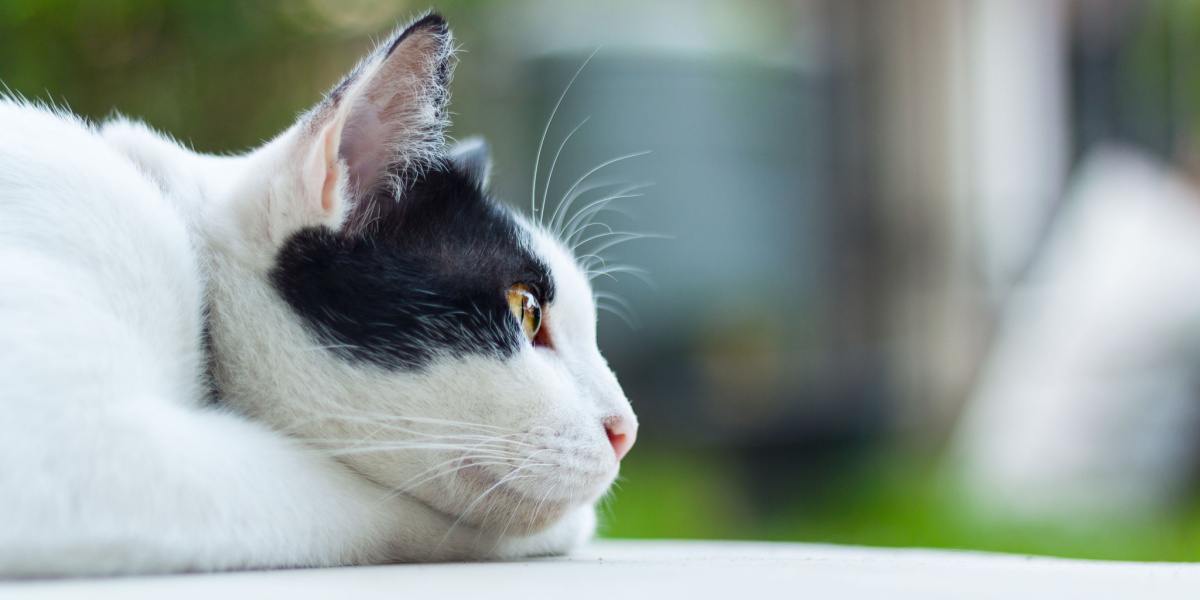
If you’ve ever wondered what your cat is thinking, you’re not alone. Cats are renowned for being curious and enigmatic creatures, as well as aloof and self-reliant. So just what is going on in that cute fluffy head?
Though not as advanced or intelligent as humans, cats have highly developed brains that allow for complex thinking and problem-solving. Cats experience a range of emotions and thoughts about food, social interactions, hunting, play, fear, and happiness. Though cats are not capable of experiencing the complex emotion of guilt, they can feel jealous when new pets or people join the family.Key Takeaways
Well, the answer is, a lot. Cats have highly developed and complex brains, which means they are capable of complex problem-solving as well as thinking. Domestic cats still have many of the same instincts and traits as their wild ancestors, and they exhibit some complex and fascinating behaviors. And there’s plenty of science to back it all up.
How Your Cat’s Brain Works
The brain is thought to be the center of intelligence, and it is divided into separate areas responsible for performing highly specialized tasks. The cerebrum is the area of the brain that is tasked with controlling thoughts.
Just like humans, cats have complex and highly developed brains. The surface is folded to increase the surface area to allow for more complex thinking and processing. The average feline brain is about 5 centimeters (2 inches) long and takes up 0.9% of the cat’s body weight compared to 2% of body weight in humans. But brain size isn’t always the best or only indicator of intelligence.
The Intelligence of Cats
One study in 2016 found that cats have 300 million cortical neurons (the part of the brain that contributes to intelligence) compared to dogs, which only have 160 million. That’s almost double, leading the authors to conclude that cats must be more intelligent than dogs.
But it isn’t always as clean cut as that, and other studies suggest the opposite. There are dozens of studies out there looking at intelligence in different size groups of animals and under various different sets of research techniques.
Unfortunately, there is no clear or certain answer as to whether cats are more intelligent than dogs. But we do know that the feline brain is a complex organ that is capable of various ways of thinking.
What Do Cats Think About Most of the Time?
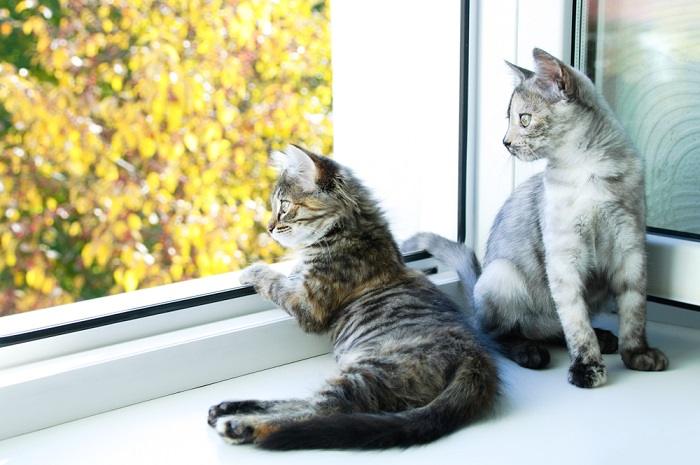
A cat’s thoughts are likely more simplistic than a human’s.
We know some great facts about the feline brain and intelligence, but what does this mean? Well, it means that cats are certainly capable of thinking, processing the world around them, and responding to it accordingly.
But what exactly do cats actually think about? It’s unlikely that cats think in the same complex way that humans do, and their thoughts are perhaps a little more simplistic than ours. It’s unlikely cats overthink anything!
1. Food
How to source food is an essential thought for cats, and probably a thought that pops into their head a lot throughout the day. Cats have developed some impressive hunting skills to ensure they get enough to eat, and even the most domestic of cats will still have strong hunting instincts.
But cats have also learned a lot about how to obtain food according to when and how we feed them. They learn to recognize the sound of the food bowl or opening a tin of cat food, but they also anticipate food if they are fed at the same time every day. If you always feed your cat at 5pm, you’ve probably noticed them hanging around shortly before this time.
Cats also recognize gestures when it comes to food, according to one study. We often use certain tones in our voice or specific gestures associated with feeding—cats learn to recognize and understand this.
2. Humans
According to cat behaviorist John Bradshaw, cats don’t actually realize that we are a completely different species. They know we are bigger than them, but they haven’t adapted much of their social behaviors when it comes to how they interact with us. So, it’s likely that they think we are the same as them. Cats rub around our legs, lift their tail into the air, and groom us—just like they do to fellow cats.
But cats only do these things to those they respect or are comfortable with, they certainly wouldn’t do it to a cat that is inferior to them. So, we can hope this means they see us as equals. Cats have a reputation for being aloof and trying to rule the roost, and any cat owner will know that they usually succeed in this.
3. Happiness and Sadness
Our feline family members are capable of thinking about happiness and sadness. We usually know cats are happy when they are relaxed as they purr or rub themselves around our legs. Most often they feel happy when they have our undivided attention, when they are close to us, or when they are playing.
But they can certainly feel sadness if they think we are not giving them the attention or resources they need or want. We often wrongly assume that cats are “easy pets” and can be left home alone all day. But that’s not the case, they miss us and feel lonely—that’s why they are so eager to greet us when we return.
4. Anger and Grudges
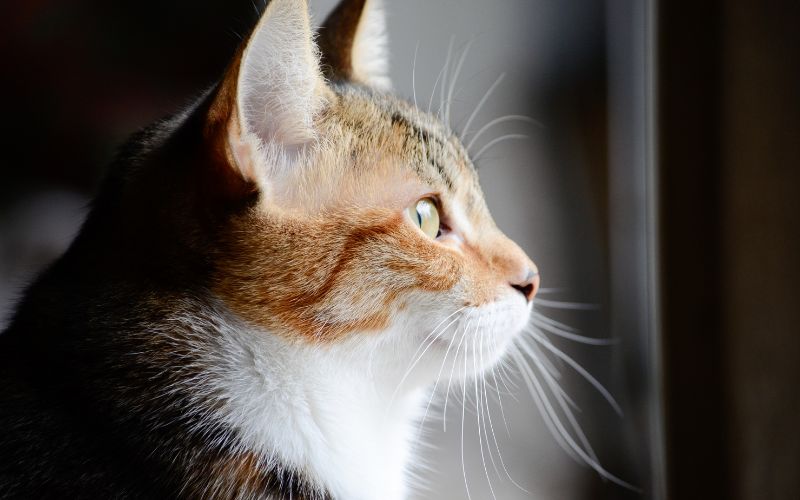
Though cats do feel anger, they don’t harbor grudges over things that happened in the past.
If a cat doesn’t like something, you soon know about it. A scratch, tap with their foot, vocalization, or even a hiss lets us know that a cat is in a situation it doesn’t want to be in. Cats like to have a choice and see an escape route. So, if we pick up a cat without warning, it might end up jumping from our arms and running away.
But cats live in the moment and their behavior is driven by action and consequence. This is commonly misinterpreted by us humans as being a motivation for certain behaviors, but cats don’t hold grudges or plot revenge!
So, a hiss is not an act of retaliation, but simply them letting us know that they didn’t like something. Your cat will soon be sitting in your lap purring as if nothing happened!
5. Fear
Cats absolutely do think about fear and feel frightened in situations they consider threatening. For wild cats, fear is an important and day-to-day thought to keep them out of danger. But for domestic cats, fear is usually felt when another cat threatens them on their territory, we put them in a carrier to go to the vet, we disturb them when they are sleeping, or if we show anger toward them.
Fear can lead to a number of behavioral and medical problems in cats, such as inappropriate urination in the house and overgrooming. The feline members of our family are highly sensitive to the world around them, so minimizing fear and stress is an essential part of keeping them happy and healthy.
6. Guilt
Cats do not think about guilt. If your cat pees on the floor they look confused and sad due to fear rather than guilt. As pet parents, we can often be guilty of showing anger or disapproval, which makes cats frightened. Rather than guilt, they are feeling fear in this situation. It’s always important to never punish your cat, redirection and positive reinforcement are recommended.
7. Jealousy
Cats absolutely do have jealous thoughts. We might notice this if, for example, you are petting your cat, and your other cat comes and tries to push them out of the way, meow at you, or start nudging your arm. Sometimes cat parents also notice jealousy if there is a new baby in the house that is getting more of our attention, or visitors to the house mean their routine is different.
It all stems from the flexible social hierarchy in feline social groups. Cats take turns owning important resources such as food or shelter, unlike dogs who have alphas in the pack. So, a cat might feel jealous if it thinks other members of its group have resources that they are lacking.
As we have already discussed, cats treat their human family the way they treat other cats, so human attention and affection are essential for them. As well as food, toys, and bedding, are important resources for them.
Final Thoughts
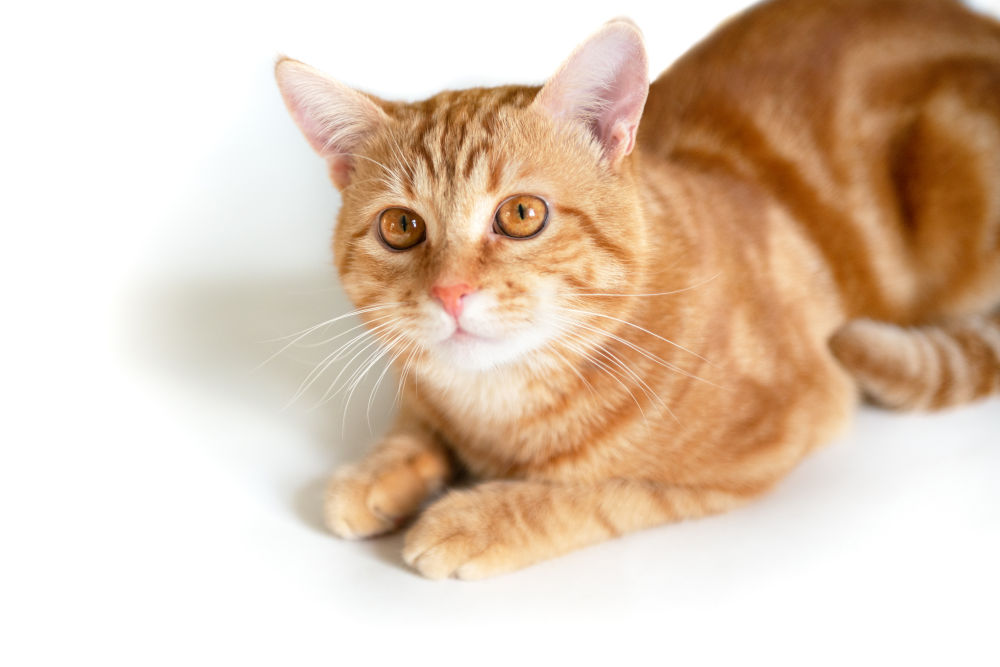
Cats experience a range of emotions and thoughts about food, their relationship with us, play, jealousy, fear, and happiness.
Cats are curious animals, and science has shown they have highly developed brains and are capable of complex thinking and problem-solving. They can think about and experience a range of emotions and ideas including food, their relationship with us, play, jealousy, fear, and happiness. Cat behavior is complex and fascinating and being able to understand your own cat will bring your special bond even closer.
Also Read: 5 Ways To Build A Stronger Bond With Your Cat
Frequently Asked Questions
What's the IQ of a cat?
The estimated IQ of a cat is around 1 to 1.71. The average IQ of a human for comparison is 7.44 to 7.8.
Are dogs smarter than cats?
A number of studies have been carried out with varying results, so we don’t have a clear answer. But we do know that cats have complex and highly developed brains that make them capable of complex problem-solving as well as thinking.
Do cats think humans are cats?
Cats recognize humans as being bigger than them, and different from them in many ways. But the social behaviors they show around us would suggest that they think of us as the same.
What does a cat think about?
Cats think about food, social interactions, hunting, and play. They can feel happy or sad and can also feel lonely. But they live in the moment and don’t feel guilt or plot revenge.

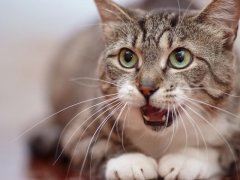
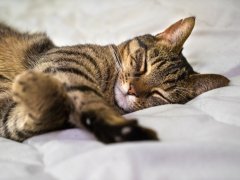
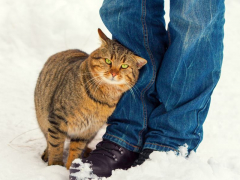
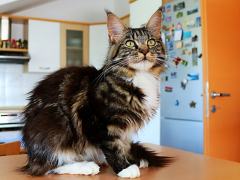

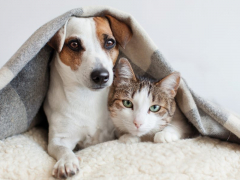
Lol. I’m very certain my cat feels guilt. Before she turned 2, she knocked over a large glass object that shattered very bad. She went from zoomie to behaving incredibly sombre and sat in one place silently. After we’d cleaned up, she behaved mellow and didn’t demand anything. This same behavioral pattern has played out whenever she urinated over her box (she tends to stand more than squat, we remedied the issue with taller boxes). After a big ordeal of cleanup, she tries what we call “rebonding,” as if she’s trying to make sure we still love her.
Maybe it isn’t guilt as humans understand, but I can tell she understands “I did something they didn’t like, and they sound not happy.” My cat reminds me of a toddler, with minimal emotional range & understanding, yet capable of mostly cating for herself.
Cats was in my Dad garage